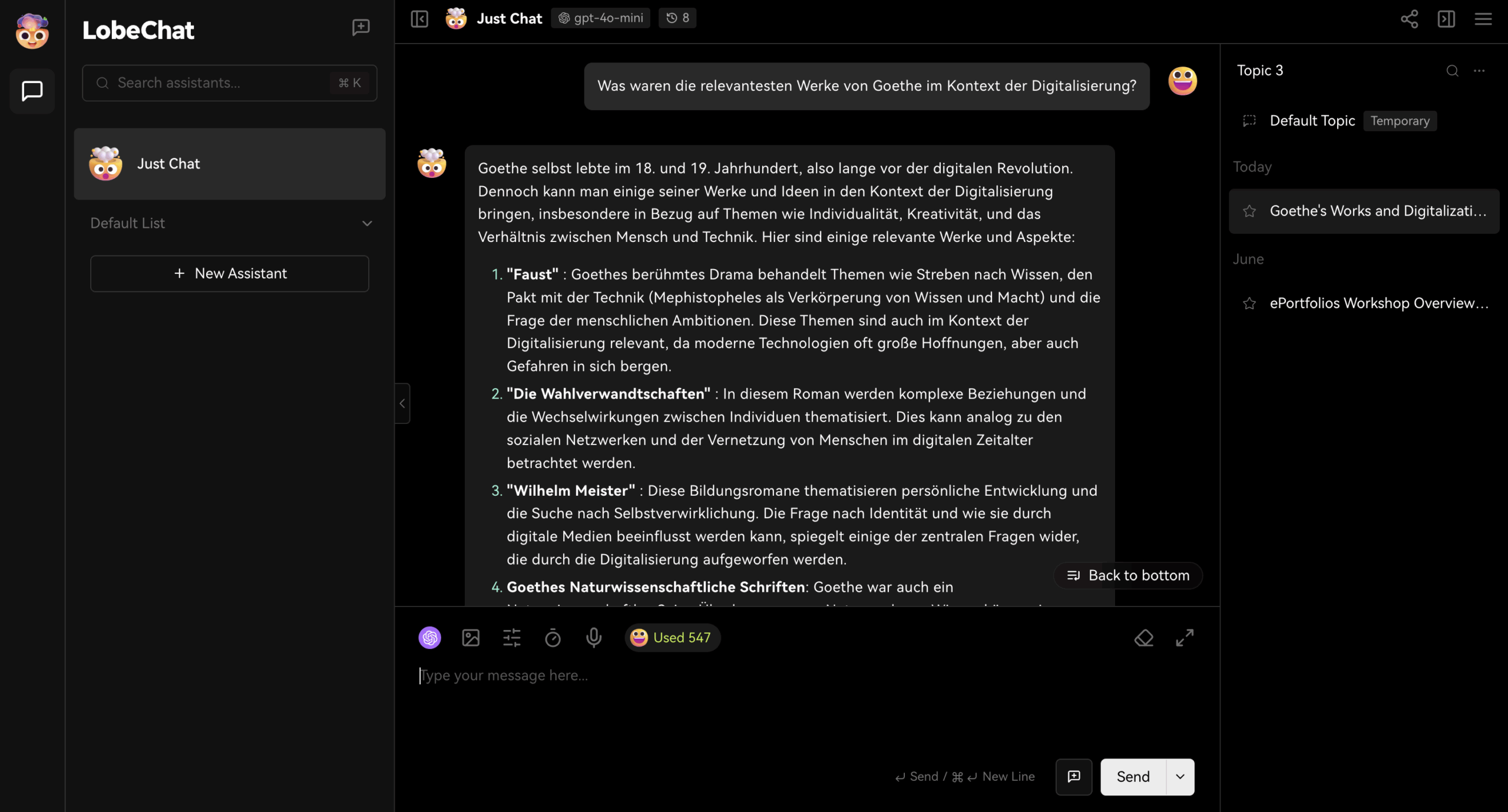
LobeChat
To communicate with Large Language Models (LLMs), users need an application that provides an interface (UI) where they can submit their questions and tasks, and where the responses generated by the connected LLMs are displayed.
One such chat UI is the open-source application LobeChat. LobeChat provides an appealing interface for communicating with AI chatbots and agents in the style of ChatGPT. The open-source application enables users to engage in advanced, AI-powered conversations and offers a wide range of features that make it particularly versatile and useful.
LobeChat has been configured by studiumdigitale for the members of Goethe University and made available for testing on servers within Goethe University.

Applications in Teaching
- Translation of content into different languages.
- Creation of suggestions for tasks and sample solutions.
- Creation of material lists for experiments.
- Brief or age-appropriate summaries of complex texts
- Generation of suggestions for the structure of a course
- Research on the most important information on a topic.
- Generation and revision of source code.
Advantages of Lobechat
- Open Source: As an open-source application, LobeChat is freely accessible and can be further developed and adapted by the community. This promotes innovation and allows for continuous improvement of the application.
- Flexibility: The support for various models and multimodal conversations makes LobeChat a versatile tool that can be used in many different contexts.
- Customizability: Through the ability to create custom agents, personal preferences or repetitive work steps can be processed more effectively
- User-friendliness: By integrating voice input and output, LobeChat offers an intuitive and accessible user experience suitable for both technical and non-technical users.
- Data Protection & Anonymization: All chat and settings data remain in the users’ browser. Requests to external services (Azure, KissKI) are anonymized
Features of LobeChat

Support for various models:
LobeChat supports a wide range of AI models, making it flexible and adaptable for different use cases. Users can select and employ the appropriate model according to their requirements.
| Azure OpenAI | KissKI | studiumdigitale |
|---|---|---|
| ChatGPT models from OpenAI | large, open models for various tasks | small, open models for simple tasks |
| at Microsoft Azure in the EU | in Germany by KissKI / GWDG | at Goethe University by studiumdigitale |
Creation of own assistants

LobeChat offers the possibility to create your own assistants for recurring tasks. With the help of role prompts and other settings, users can develop their own assistants that support them in processing repetitive tasks more efficiently and mapping their own preferences.
Speech input and output
The platform offers both voice input and voice output, which makes interacting with the chat bots and agents particularly intuitive and user-friendly. This makes it possible to conduct natural language conversations and facilitates use for people with different needs and preferences.
Multimodal conversations
LobeChat supports multimodal conversations, which means that in addition to text, other media types (initially only images) can be integrated into the communication. This expands the possibilities of interaction and makes the conversations richer and more informative.
FAQs
Important Notes
⚠️ Data protection: It is not permitted to send personal or sensitive data to the LLMs.
📚 Requirement: Completion of the training on the critical use of AI (according to EU AI-VO)
🎯 Fair-Use: Fair-use restrictions apply to GWDG models – avoid stress tests
Support
If you have any problems or questions, write an email to the AI-ToolLabs team.
Credits
LobeChat is developed by LobeHub.
studiumdigitale operates a preconfigured instance of LobeChat for users of Goethe University.
All images, logos, and used files are the property of LobeHub.
Apache License 2.0 | GitHub
